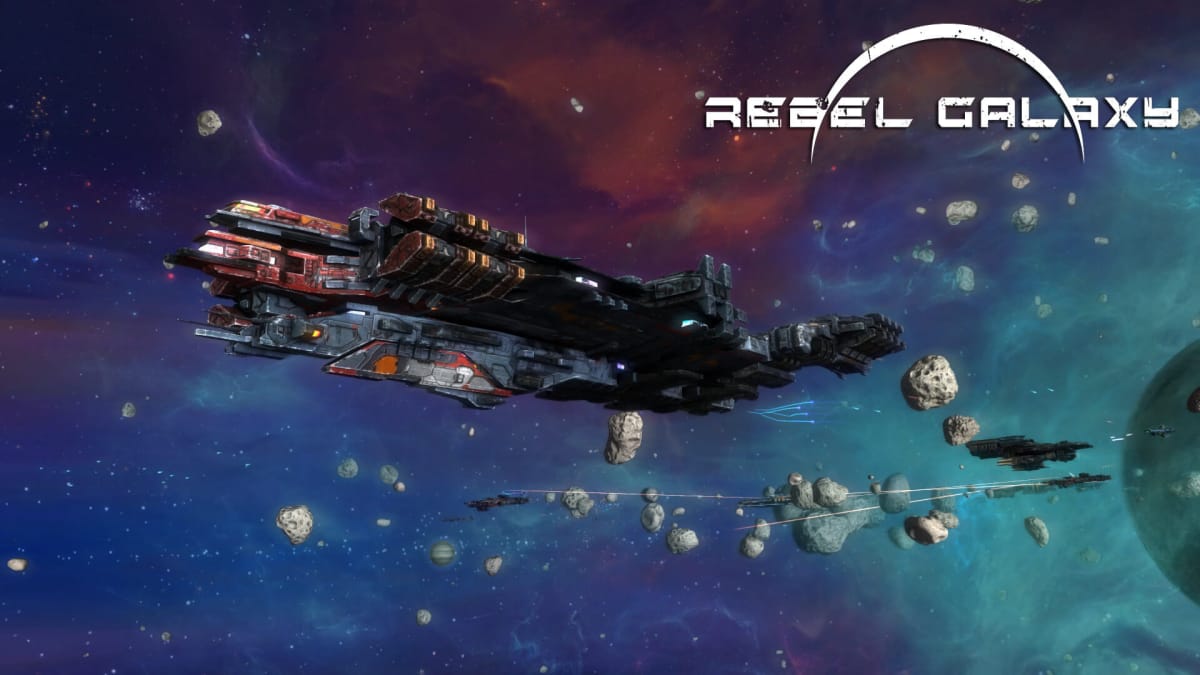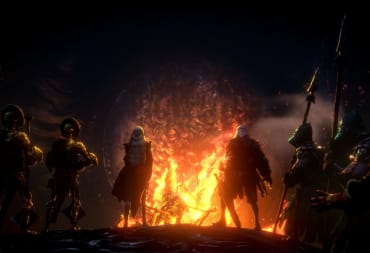I typically prefer to begin my reviews by explaining how I came to find out about the game and what interested me in reviewing it. This is the first case in a long time where I was 100% sold on a game based on the trailer alone. Have a look at Rebel Galaxy's trailer for yourself. Perhaps you'll understand where I'm coming from.
It speaks for itself. Whoever put together the Release Date Trailer for Rebel Galaxy (developed and published by Double Damage Games) is an artist.
When a video game puts up a trailer you make some assumptions. You see representations of gameplay and the overall aesthetic of the game. You can get an idea of how it plays and what's important in the game by what the trailer shows you. If you watched the trailer and thought (as I did) "this is going to be a lot of flying around awesome spaceships firing lasers and missiles set to the tune of cowboy-esque rock music in space," I can tell you with assured confidence that Rebel Galaxy does not fail to deliver.
It's not just the gameplay that hooked me; I find Rebel Galaxy's music absolutely wonderful. It brought me back to the Space Westerns I so enjoyed in my youth like Trigun, Outlaw Star, and of course Firefly.
Rebel Galaxy's trailer rightfully chose one of the best tracks (Evil Ways by Blues Saraceno) to show off the game. I found all of the music in the game fantastic. In the 40 or so hours it took me to complete the game, I was nowhere near tired of it. I was actually disappointed when a battle completed and the game would fade out a track that I was really enjoying.
The game's visuals are quite lovely as well. I have what can be charitably described as a midrange computer (and a 560TI), and yet I was able to crank everything up to its maximum. It's unsurprising that a multiplatform game that's releasing on consoles wouldn't exactly require Quad-SLI Titans, but for the relatively little graphical power Rebel Galaxy requires, it sure does look nice. Combat is a visually stunning lightshow of lasers and missiles flying through the empty expanse of space. The various nebulae and planets in the background are reminiscent of the sort of awe-inspiring pictures you'd see NASA release every now and again.
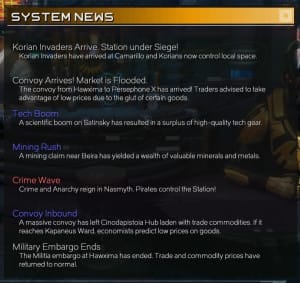
The news board at every Space Station's bar will tell you about the general state of the area you're in.
I would be remiss if I didn't state that the initial launch of the game caused my computer to blue screen. However, I'm more than willing to chalk that up to an issue with my computer in some fashion as opposed to an issue with the game itself. I had no crashes or problems other than the one the first time I ran Rebel Galaxy, and I believe it was a fluke more than anything else.
I played with a keyboard & mouse, but Rebel Galaxy should work excellently with a controller. There were almost no bad symptoms of "console-itis"; aside from the E key being a bit overused for contextual actions, I had no problems with the controls.
The game proper begins with a conversation. Your aunt Juno has disappeared, and you've been left a very outdated ship with which to find her. Your journey takes you across multiple star systems where you have a wide range of choices for making your name. You can be a law-abiding free agent who doesn't abide piracy and thieves. You can prey on mostly-defenseless mercantile convoys and profit from the misery of others. You can even (to some degree, at least) mostly avoid combat and focus on being a blockade runner trying to make it to the next station with a hold full of valuable cargo.
Space stations in Rebel Galaxy act as quest hubs and more importantly save points. I found myself losing out progress on a mission or two because I foolishly decided to attempt to complete a few missions in a row while vastly outgunned. It's rare that you won't be able to make it to a station and dock between missions (much less during missions). You should take advantage of the opportunity to repair, resupply, and save your game at every opportunity lest a barrage of missiles from a super swarm of Korian Outsiders wipe out the last half hour of your progress.
Although all space stations in the 14 star systems of Rebel Galaxy are functionally identical, you will nonetheless be moving between them quite often. Stations have different faction allegiances, so some will be off-limits to you entirely depending on the choices you've made. They all carry different inventories of weapons and ships for sale. Some of them are owned by organizations, such as the Merchant's Guild or Mercenary's Guild, which require an entry fee to join them and use their services. Paying the fee for the guilds is absolutely worth it, as it allows you access to unique missions and equipment.
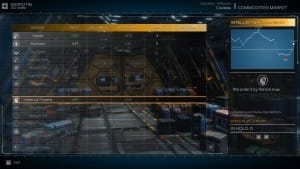
In space, no one can hear you being DMCA'd.
One of the notable features of Rebel Galaxy is how it handles the purchasing of equipment and ships. Although this game can be spiritually considered an action RPG—and it's no surprise considering the developers originally hail from Runic Games, the developers of Torchlight and Torchlight II—it wholly avoids the "Everything sells for half value" trope that has been in RPGs since time immemorial. If a ship costs 1,000,000 Credits, and your current ship is worth 400,000 Credits, you can buy the newer ship for 600,000 Credits. If you decide you want to go back to the old ship, you're given those 600,000 Credits back. That kind of mobility in purchasing ships and equipment makes it more palatable to take a ship out for a spin and see how it flies. If you don't like the ship (or the new guns you've fitted on your ship) Rebel Galaxy's spaceship dealers have a 100% money-back guarantee.
There is also a robust commodities market. Anyone who has played EVE Online is familiar with the space-opera themed sort of vendor trash. There's items such as Pure Water, ore, and mundane technological parts like Robots or Ceramic Plates. There's also contraband, such as Space Slaves and Live Organs, and while some of these items can be highly profitable, you may find yourself being hailed by a Militia Ship asking you to turn it over immediately—or else.
Prices for items have their highs and lows in a system, and an entrepreneurial player can spend an awful lot of time raising funds simply by flying between stations and living out the old economics maxim of "Buy Low, Sell High." I raised a fair bit of my early capital in this fashion. In the later game I took advantage of my ship's larger hold to stock up on any valuable items that were being sold for particularly cheap at the station where I docked.
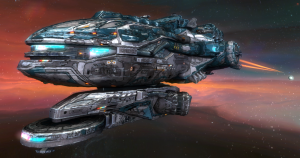
The prices are partly tied to the current status of a station. The Stellar Map will give you a general indication of conditions. Some stations will find themselves under siege by pirates and your typically peaceful slowboat run to docking range will be replaced with trying to fly through a field of engine-imparing mines, while the local Militia and an enemy faction duke it out. The arrival of a trade convoy will flood the local market with goods and make buying commodities cheaply a cinch. Rarely, a station will be in a crisis state and you'll find yourself completely unable to dock.
The actual piloting of your ship in Rebel Galaxy takes place on a 2D plane. Many space games utilize all three dimensions for tactically complex gameplay. Rebel Galaxy has deliberately kept things on a flat plane giving the game more of a naval feel. Most of your weapons can be AI-controlled in one fashion or another, but your broadside weapons are always manually targeted. Attacking an enemy at range with your broadsides will typically require charging them up to improve their accuracy. It's much easier (and much more fun) to simply pull up right next to them and keep firing your broadside weapon of choice until your enemy explodes into a cloud of debris.
All ships have their defenses split into four quarters—Forward, Rear, Port, and Starboard. Positioning is very important in Rebel Galaxy. If you've taken too much damage on your Starboard side, it's prudent to try to reposition your ship so you can protect a more vulnerable area. Kiting enemies away from the group can turn an impossible battle into a winnable battle if you're careful with your positioning.
When your shields fail, you will start taking damage to your hull plating and your subsystems. Shields can recharge, but hull plating and subsystems are damaged permanently until you get it fixed at a station. If your shields are down and your hull plating is gone, you'll be faced with the prospect of exploding and having to reload from your last checkpoint.
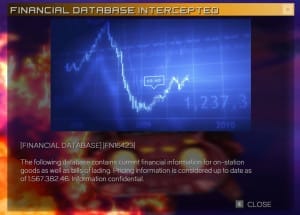
Successfully completing the hacking minigame in Rebel Galaxy will net you useful information, such as the prices of goods or the location of valuable goods awaiting pickup.
You also have the option of a deflector that lasts for a short period of time and must recharge. Deflectors will completely protect your ship from incoming damage from any side and are great for affording your shields time to recharge. Unfortunately, engaging your deflectors puts you in a wholly defensive posture as you can't fire any of your weapons while they're up. Conversely, you can turn a defensive tool into an offensive tool by equipping Ramming Deflectors and smashing into enemy ships to cause damage.
You have the choice of a wide variety of vessels that run the gamut from sleek corvettes to massive dreadnoughts. I preferred to go with a good compromise between maneuverability and size—I often managed to win fights through judicious use of boosters and turning in order to get the most out of my shields and hull plating.
Your ship has engines that can be set to one of four preset speeds. An optional rechargeable booster is an essential piece of equipment that will help you make that turn just in time or escape from an ambush right before a missile strikes a fatal blow.
Warping in the game isn't a scripted point-to-point event. Warp is slowed (or entirely interrupted) by massive objects. Once you're far enough away from any hostile craft or sufficiently large objects (such as planets or space stations), your ship will accelerate to sublight speeds automatically and you'll eventually get the prompt to engage warp. If you pay attention to where you're flying and your radar, you can avoid slowing down by giving planets, asteroid fields, and nebulae a wide berth. Some missions will have unavoidable ambuses where you get pulled out of warp by a hostile fleet, but if you can survive the initial onslaught and get far enough away you can leave your attackers in the dust. Running is always an option in Rebel Galaxy.
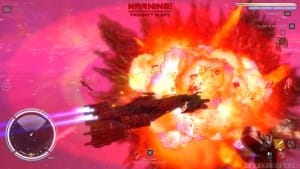
I must admit that I found myself frustrated at some points in Rebel Galaxy. One particular mission in the first system involves attacking a space station to rescue someone. An NPC named Zenya had a habit of getting herself blown up. (I was clearly not the only one with this problem as a pre-release patch increased the NPC's defenses.) It took me about a dozen tries to get past this particular mission between either Zenya or myself getting blown up. I eventually managed to find the right mix of kiting and other aggressive flying to get everyone out alive.
And really, that is one of the things that surprised me most about Rebel Galaxy. I realized that I wasn't insomuch frustrated as I was actually challenged. Rebel Galaxy gave me all the information I needed and then kicked me out into their little group of star systems. Oh, a mission is too hard? Run some side quests and outfit your ship better. An NPC got blown up? Too bad, you probably should have covered them better. It was unforgiving at times but it was never unfair in my eyes. Every failure was a learning opportunity. That is a fundamental principle of gaming that so many modern releases just simply fail to get right. Don't get me wrong, your ship and equipment does matter in Rebel Galaxy. But if you fly skillfully and manage your resources well, you can win a fight that you otherwise wouldn't be able to. That's probably what I loved most of all.
Rebel Galaxy feels like Eve Online Lite to me. If you're a fan of flying around in a spaceship unraveling alien mysteries, exploiting market forces, and ducking the lawman because you just happen to have a cargo hold full of Narco Cola, then Rebel Galaxy would be an excellent game for you to play. It is so lacking in flaws that I honestly cannot think of any worth mentioning. It is not an expansive game by any means, but it is a sturdy game with a well-written story that will captivate fans of science fiction and space games for at least the 30-40 hours it will take to complete the main campaign. Rebel Galaxy is elegant in its design and execution of its gameplay.

When I completed the story, I shared a celebratory drink with someone at a run-down bar in one of the many space stations in the sector. And that was that—kicked back out into the vast expanse of space ready to take on whatever the universe decides to throw at me. I'd completed the story, but I had the opportunity to gallivant around the galaxy a bit more if I so desired. It's a tempting offer, and I think I'll take Rebel Galaxy up on it for just a little while longer.
You can pick up Rebel Galaxy for $20 (or your regional equivalent) on Steam and GOG. It will be coming to PS4 and XBox One sometime after the PC release.
Rebel Galaxy was provided by the developer and reviewed on the PC.
Review Summary
Pros
- Wide Galaxy to Explore
- Freedom of Choice in Occupation or Gameplay
- Long Campaign, Tons of Replayability
Have a tip, or want to point out something we missed? Leave a Comment or e-mail us at tips@techraptor.net
